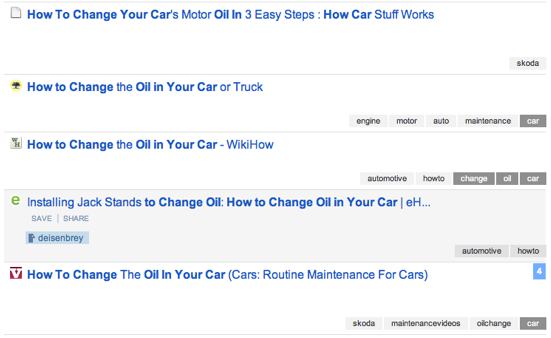The Convergence of Search and Social Media
This YouMoz entry was submitted by one of our community members. The author’s views are entirely their own (excluding an unlikely case of hypnosis) and may not reflect the views of Moz.
Search vs. social seems to be the battle of the decade. And while I don't believe that search engines will soon become extinct at the hand of social media, it is true that more and more people are finding content through social media. What this shift comes down to is a simple case of credibility.
Take for example the phrase "how to change your oil." Type these keywords into Google, and this is what comes up:

These two web pages were likely optimized to show up at the top of Google's search rankings for "how to change your oil". We can see the keywords are right in the title of the article. But these results don't give the user any information about the value of these pages. There are a variety of reasons why a certain site or page may appear on the first page of results, but being ranked high by search engines does not imply valuable content.
Now, let's search "how to change your oil" again. But this time, we'll use Facebook. Here's the first result that shows up:

While this community page may appear first because of the well thought out keywords in the page's title, this result carries more weight than the results served up by Google. Why? You'll notice that the post has two Facebook users who liked the post. Those likes add credibility to the post; they tell other users that the video was actually helpful, and that real people thought so.
Lastly, let's search our keywords again using a social bookmarking site. Here is what comes up when you type in the keywords "How to change your oil" on Delicious:

All of these results were bookmarked by people who thought they were worth referencing and sharing with other users. Real, live, breathing people - not search algorithms - determined that this content was the best based on the keywords we entered.
Think Viral
It's not enough for businesses to create content or webpages that are optimized for search engines. It's not enough to have the right target keywords in your page title and page meta description. That may get a business's content discovered, but the future of social search is more than just discovery. It's about creating content that's so eye popping or useful that it has to be shared with friends. Businesses have to take that content and distribute it through social media channels with the hope that others too will share it across various social media platforms. Shareable content is and will continue to be the focus of social search. This means a greater emphasis on pictures and videos, which are shared more often and can engage mass audiences more so than written content.
Encourage Sharing
One of the best ways to encourage sharing should be the least surprising; asking for it. Whether it's asking for a retweet or for a follower to share a link with a friend, it never hurts to ask. Make sharing as easy of a process as humanely possible. You can never have too many Share/Tweet/Post buttons!
What do you think - is shared content the future of internet search?



Comments
Please keep your comments TAGFEE by following the community etiquette
Comments are closed. Got a burning question? Head to our Q&A section to start a new conversation.